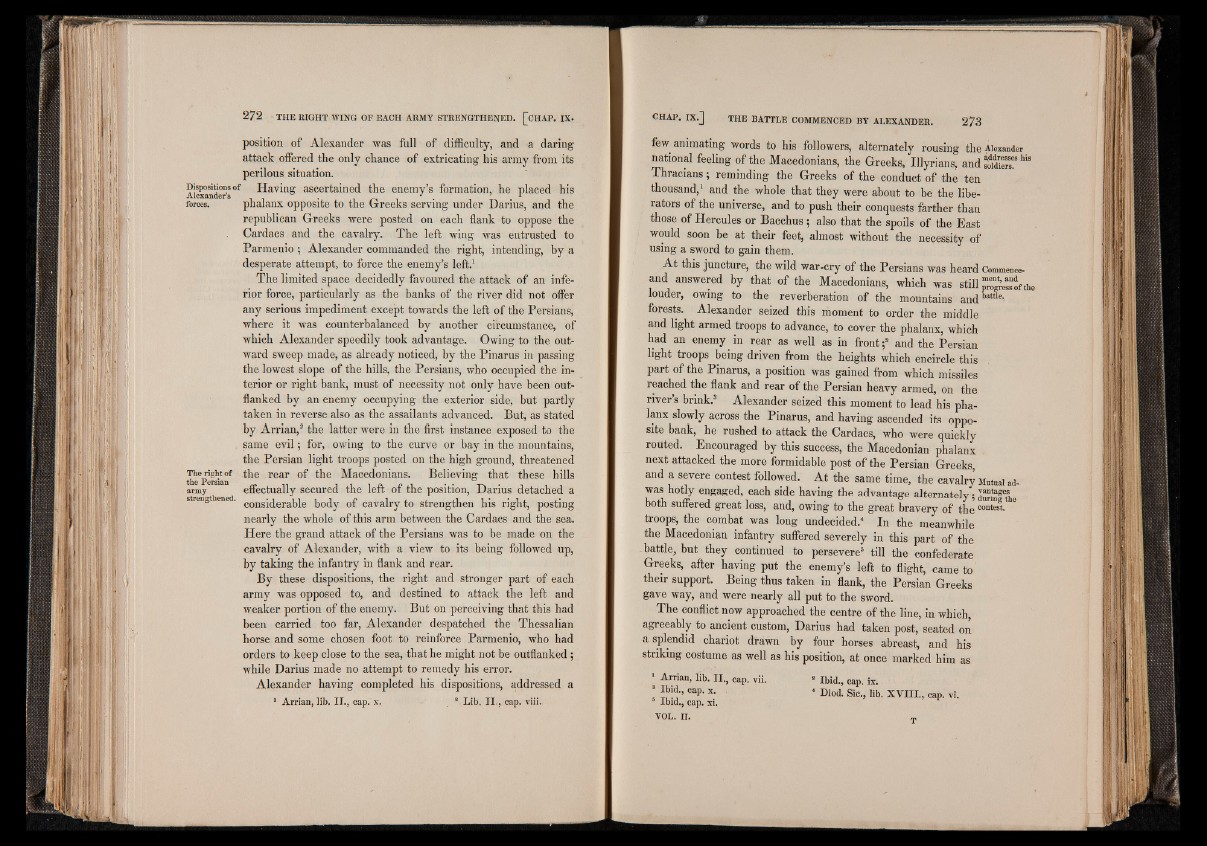
position of Alexander was full of difficulty, and a daring
attack offered the only chance of extricating his army from its
perilous situation.
Alexander's°f Having ascertained the enemy’s formation, he placed his
forces. phalanx opposite to the Greeks serving under Darius, and the
republican Greeks were posted on each flank to oppose the
Cardacs and the cavalry. The left wing was entrusted to
Parmenio ; Alexander commanded the right, intending, by a
desperate attempt, to force the enemy’s left.1
The limited space decidedly favoured the attack of an inferior
force, particularly as the banks of the river did not offer
any serious impediment except towards the left of the Persians,
where it was counterbalanced by another circumstance, of
which Alexander speedily took advantage. Owing to the outward
sweep made, as already noticed, by the Pinarus in passing
the lowest slope of the hills, the Persians, who occupied the im
terior or right bank, must of necessity not only have been outflanked
by an enemy occupying the exterior side, but partly
taken in reverse also as the assailants advanced. But, as stated
by Arrian,2 the latter were in the first instance exposed to the
same evil; for, owing to the curve or bay in the mountains,
the Persian light troops posted on the high ground, threatened
T h o n g b t ° f the rear of the Macedonians. Believing that these hills
army effectually secured the left of the position, Darius detached a
streugthene . cons;^erable body of cavalry to strengthen his right, posting
nearly the whole of this arm between the Cardacs and the sea.
Here the grand attack of the Persians was to be made on the
cavalry of Alexander, with a view to its being followed up,
by taking the infantry in flank and rear.
By these dispositions, the right and stronger part of each
army was opposed to, and destined to attack the left and
weaker portion of the enemy. But on perceiving that this had
been carried too far, Alexander despatched the Thessalian
horse and some chosen foot to reinforce Parmenio, who had
orders to keep close to the sea, that he might not be outflanked ;
while Darius made no attempt to remedy his error.
Alexander having completed his dispositions, addressed a
1 Arrian, lib. I I ., cap. x. a.Lib. I I ., cap. viii.
few animating words to his followers, alternately rousing the Alexander
national feeling of the Macedonians, the Greeks, Illyrians, and 8 ® * *
Thracians; reminding the Greeks of the conduct of the ten
thousand,1 and the whole that they were about to be the liberators
of the universe, and to push their conquests farther than
those of Hercules or Bacchus; also that the spoils of the East
would soon be at their feet, almost without the necessity of
using a sword to gain them.
At this juncture, the wild war-cry of the Persians was heard Commence-
and answered by that of the Macedonians, which was still “" o f th e
louder, owing to the reverberation of the mountains andbattle-
forests. Alexander seized this moment to order the middle
and light armed troops to advance, to cover the phalanx, which
had an enemy in rear as well as in front;2 and the Persian
light troops being driven from the heights which encircle this
part of the Pinarus, a position was gained from which missiles
reached the flank and rear of the Persian heavy armed, on the
river’s brink.3 Alexander seized this moment to lead his phalanx
slowly across the Pinarus, and having ascended its opposite
bank, he rushed to attack the Cardacs, who were quickly
routed. Encouraged by this success, the Macedonian phalanx |
next attacked the more formidable post of the Persian Greeks,
and a severe contest followed. At the same time, the cavalry Mutual ad-
was hotly engaged, each side having the advantage alternately; S s?i
both suffered great loss, and, owing to the great bravery of the*'UnilS *
troops, the combat was long undecided.4 In the meanwhile
the Macedonian infantry suffered severely in this part of the
battle, but they continued to persevere5 till the confederate
Greeks, after having put the enemy’s left to flight, came to
their support. Being thus taken in flank, the Persian Greeks
gave way, and were nearly all put to the sword.
The conflict now approached the centre of the line, in which,
agreeably to ancient custom, Darius had taken post, seated on
a splendid chariot drawn by four horses abreast, and his
striking costume as well as his position, at once marked him as
1 Arrian, lib. I I ., cap. vii. a Ibid., cap. ix.
* IbnL, cap. x. 4 Diod. Sic., lib. X V I I I ., cap. vi.
Ibid., cap. xi.
VOL. m m
during the
contest.